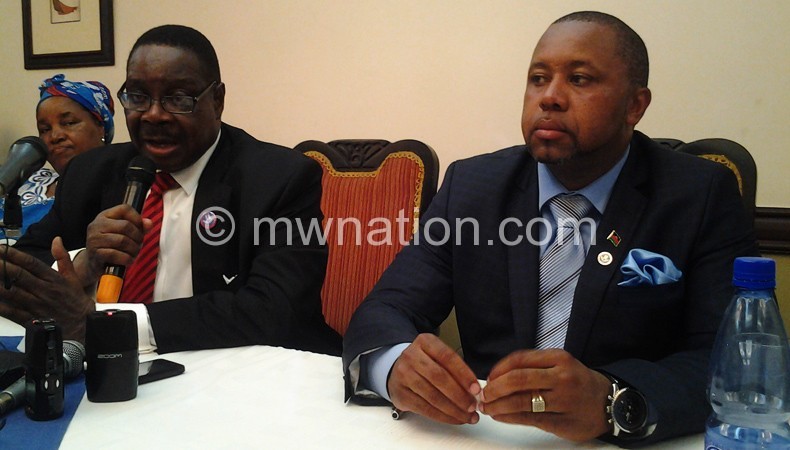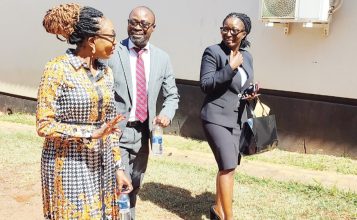Rethinking presidential advisers
What advice do sitting presidents need to warrant them to appoint a congress of advisers? EPHRAIM NYONDO writes.
As of Thursday last week, President Peter Mutharika has over 10 advisers. They are advisers on national unity, parliamentary affairs, HIV and safe motherhood, economic affairs, non-governmental organisations, religious affairs as well as communication and strategy, among others.

In fact, Bright Malopa—former director general of Malawi Broadcasting Corporation (MBC), who is now presidential adviser on communication strategy—told The Nation on Friday last week that he is “immensely pleased to be part of Prof Mutharika’s brilliant team in part because our State President has a brilliant programme to industrialise this country”.
He continued: “I have had endless discussions with the President about his vision and how he wants it communicated to his people.”
But critics have been quick to question what, actually, would be the job for Malopa. Writing in his Sunday Times column, British Broadcasting Corporation (BBC) correspondent Ralph Tenthani was blunt.
“What will my good friend Bright Malopa be doing at State House as chief strategist (communications) when we have a whole Ministry of Information, complete with a Minister and Director of Information and a congested State House Press Office?” he wrote.
What Tenthani argued about Malopa’s job could, as well, be extended to other presidential advisory offices, among others, economic affairs when there is a whole Ministry of Finance and Economic Development, and HIV and safe motherhood when there is a presidential initiative in the Ministry of Health.
Some even question why there should be a presidential adviser on parliamentary affairs when there is a leader of the House in Parliament.
The Constitution, too, provides in Section 92 (2) that “…the Cabinet shall be responsible for advising the President with respect to the policies of the Government and with respect to such other matters as may be referred to it by the President”.
This, according to Wiseman Chijere Chirwa, professor of history at Chancellor College, represents a challenge of defining the actual job of people who are appointed as presidential advisors.
“Their job description is not clear. Their offices, undefined. We cannot even tell if their offices are under the civil service or not,” he says.
Chirwa also questions what specifically will these advisors advise the President on.
“My understanding is that an adviser should be somebody with privileged knowledge over a particular matter—knowledge which a president cannot find elsewhere. But in Malawi we have a situation where the appointed people are not experts, at the same time there is a structure which has a lot of experts,” he says.
He warns that, if left undefined as the case is today, presidential advisors, one day, will turn out to be a parallel Cabinet.
The appointment of presidential advisers has not started with Peter Mutharika’s presidency. All former presidents—from Bakili Muluzi through Bingu wa Mutharika to Joyce Banda—appointed advisers.
Dr Henry Chingaipe, a governance and development specialist, sees the trend of appointment as a mark of patrimonial leadership and politics of appeasement where groups of people feed off the State through a president who plays the role of a patron.
“One gets the impression that the government is caught between a rock and a hard place. On one hand, they create an impression that they want to do serious reforms and create an efficient and effective bureaucratic State while on the other, the political calculus is that they have to appease or reward supporters and sympathisers by creating opportunities for them to feed off the State,” he says.
And experts have always singled out politics of patrimony and appeasement as a key obstacle to development, mostly in poor countries such as Malawi.
That is why there are strong calls by various quarters to revisit how presidents appoint their advisers in the country.
Chancellor College associate professor of law Edge Kanyongolo argues that the fundamental challenge is that, currently, our laws do not have provisions of regulating the appointment of presidential advisers.
“Presidential advisers are just appointed and dismissed at the discretion of a president. However, any exercise of power in democracies needs to be regulated,” he says.
And Khumbo Soko, a legal practitioner, advances that there is a provision in the President and Salaries Benefits Act for personal assistants which presidents are entitled to.
“These may be advisers and the law has not placed any cap. The fact that the Constitution appoints ministers in Cabinet as advisers to the President (among their other functions) does not exclude the possibility of there being other advisers,” he says.
However, Kanyongolo cautions that ‘assistants’ cannot pass for ‘advisors’. He, thus, proposed that it is high time Malawi developed legal provisions to guide the process of appointing presidential advisors.
However, as Chirwa argued that there is already a built system which can provide advice to president, does the President, really need advisers?
Chingaipe says some advisers are important and necessary, especially those whose portfolios are not covered by a ministry or department such as adviser on religious affairs.
“But most of what has been announced could surely pass for duplication as there are offices or departments that already do the advisory work for government and some of the departments have the best known experts on the subject matters,” he says.
Chirwa says, in rethinking presidential advisers, we need to agree on their tenure.
“Should advisers be on full-time jobs? Or they should just be needed for a specific time? Does it make sense that we should have a permanent office of a presidential adviser on NGOs, or such advice needs to come when there is a need?” he asks.
Kanyongolo, however, proposes two critical issues that the law, if there will be a review, needs to take into account as part of the regulation process.
“We need to specify advisory positions that the president needs advise on. We also need to regulate the number of advisors. I have noted a serious ghost element in these presidential advisers,” he says.





